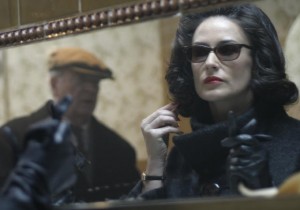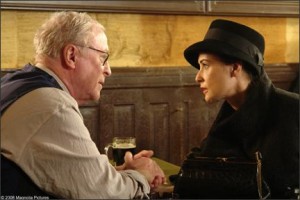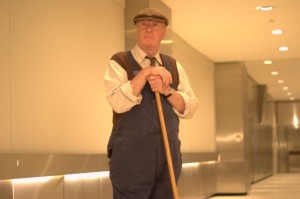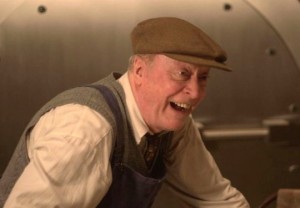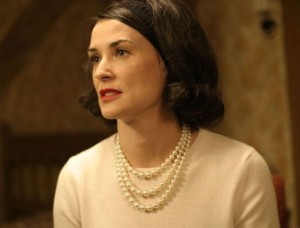Flawless (2008)
A retiring janitor and a frustrated female exec rob their diamond company employer in 1960 London.
Genre – Drama
Director(s) – Directed by Michael Radford
Writer(s) – Edward Anderson
Cast – Michael Caine and Demi Moore
Blue Rider’s Role – Arranged bridge financing
Distributor(s) – MGM, Bauer Martinez Studios, Hoyts Distribution (Australia), Independent Films (Netherlands), Blue Sky Media (Czech Republic)
Release Date – 2008
Synopsis – A crime drama set in 1960 London, where a soon-to-retire janitor (Michael Caine) convinces a glass ceiling-constrained American executive (Demi Moore) to help him steal a handful of diamonds from their employer, the London Diamond Corporation.
Boxoffice and Release Data:
As of January 6, 2008, Flawless had played in Spain for 12 weeks, grossing $2,295,114. It was due to open in France and some North African former French territories at a date to be determined. It opened in Indonesia in September 2007 and had a planned March 2008 release in Singapore. It opened in Iceland on June 11, 2008 and in Mexico on July 27.
Flawless opened in North America at 35 theatres on March 28, 2008 and grossed $181,910 in its initial three-day weekend for a very healthy per-screen average of $5,197. It ranked #37 among the top 50 theatrical releases from March 28-March 30, 2008.
In its 16th week of domestic release (through July 17) it had grossed $1,200,234, ranked #88 among the movies currently in theatres and was still showing on three screens.
Worldwide gross through July 12, 2009 was $6,797,252, and the film had brought in $5,597,018 in 24 foreign countries. It was
still screening in Belgium and Luxembourg, where it had grossed $11,337 in its first five days.
In 84 days playing in Brazil (Apr. 11-June 22, 2008), Flawless grossed $1,518,622. Through July 6, according to The Hollywood Reporter, it grossed $305,535 in its first 10 days on Mexican screens and was the #10 boxoffice champ; after five months on Mexican screens (through Nov. 16) it had brought in $1,000,041. As of Dec. 21, 2008 it had grossed $251,236 in a eight-week run in Argentina. It did $213,503 in a month run in Venezuela.
As of August 20, 2008, according to The Movie Times, Flawless rates #114 in boxoffice receipts among the 223 films released in the U.S. that year.
Flawless came out on DVD on June 3, 2008. On July 20, 2008, it had been out on video for seven weeks and ranked #40 in rentals of all films currently on video/DVD. On July 30, 2009, in its 14th month of release, it ranked #26 on Amazon.com’s chart of British Mystery and Suspense DVDs.
Critic’s Kudos:
Bill White, Seattle Post-Intelligencer
(Title:”Demi Moore transcends the mediocrity and mistakes of her past in the well-crafted ‘Flawless.'”): “As Quinn, Moore redeems herself from the mediocrity of her Brat Pack years (‘About Last Night,’ ‘St. Elmo’s Fire’) and the career-killing mistakes of early adulthood (‘Striptease’ and ‘G.I. Jane’). Having matured into a convincing middle-age actor, she comes across as intelligent, sophisticated and driven.
Caine gives Hobbs a working-class twinkle with a touch of Alfie smirking through.
“Director Michael Radford can work suspense into a situation without cheapening the scene. One example is the party at which Quinn searches for the combination to the company vault. He uses Hitchcock’s technique of establishing an air of dread before the clandestine activities begin. Little touches, such as the reflection of a lightning storm in a landscape painting, help establish an ominous mood rife with suspicion and paranoia.
“The heist itself is brief and taut. Radford uses a wonderful piece of music with a repetitive riff inside a squared-off rhythm to create tension as Caine measures the intervals during which the vault is out of sight of the security camera. When the vault finally opens, the music bursts free of its rhythmic constraints.
“The pleasure of watching such well-crafted entertainment offsets the small disappointments.”
James Berardinelli, Reel Views: “Heist movies have always been cinematic staples but never have they been as popular as in recent years. It’s easy to understand the appeal of a well-made example: there’s pleasure to be found in the twists and turns of the script. But there may be an additional vicarious thrill in a story that details how the ‘little guy’ (represented by the criminals committing the heist) outsmarts the faceless corporate giant. By their nature, heist movies cause viewers to identify with the thieves; this is made easier in something like Flawless where there’s moral justification for an act of lawlessness.
“At the heart of Flawless lies a mystery – one that takes both the viewer and the characters by surprise and requires some ingenuity to unravel. While some members of the audience may guess at what has happened (it is foreshadowed, albeit in a subtle manner), most will not until director Michael Radford is almost ready for the ‘reveal.’
“Caine can make even the most bland character seem interesting and, while Hobbs is not the best-defined protagonist ever to venture into a heist, Caine deepens and enriches him. His short monologue late in the film is touching. This is Joss Ackland gets to play a ruthless despot – he’s especially good at those. Who can forget his ‘diplomatic immunity’ refrain from Lethal Weapon 2? Lambert Wilson is the no-nonsense crime investigator Finch who shows up in the second half of Flawless and develops a connection with Laura.
“With this movie, Radford gets to touch on some ‘hot’ social issues of the day, such as the glass ceiling for career women and the concept of blood diamonds. While these aren’t crucial to the central story elements, they provide context for what transpires and allow Laura and Hobbs to take the moral high ground. Their act is unquestionably lawless, but it’s hard to argue that there’s an element of justice to it. This goes back to one of the reasons many viewers watch heist movies – to see David triumph over Goliath. The victory is more sweet when David is fighting the battle for something less ignominious than personal gain. As heist films go, Radford has crafted an engaging one with Flawless. It’s good disposable entertainment that offers the right mix of character identification, plot unpredictability, and suspense to keep viewers interested throughout. Because this is being released under the umbrella of Mark Cuban’s empire, it is showing up both theatrically and on pay-per-view TV around the same time, which will allow those who avoid multiplexes to see this in the comfort of their living rooms.”
Joe Neumaier, New York Daily News (Title: “Michael Caine and Demi Moore Shine in Flawless”): “In the diamond-heist thriller Flawless, there is a nice sense of style and appreciation for tense face-to-face confrontations among characters trying to ignore the temptations around them. It’s sort of the opposite of the current robbery flick The Bank Job – all substance and no flash.
“Director Michael Radford (Il Postino, The Merchant of Venice) has some fun setting scenes in photogenic yet obvious locations – a scheme is revealed in a movie theater with cigarette smoke swirling in the projected light; meetings are held in a shadowy tunnel that seems to go on forever. There are also plenty of stately rooms, guys in tuxedos and bowlers on heads.
“Moore’s usual sedate acting style works to her benefit here, and in middle age she finally has the seriousness to do roles like this without resorting to throaty indignation. This is Moore’s biggest role in 10 years, not counting her extended cameo as a comic-book villainess in the Charlie’s Angels sequel; it’s actually nice to have her back, and starring in something dignified.
“Caine is, as always, Michael Caine. But that’s not necessarily the phone-in it meant in the ’80s and early ’90s. He fills out even smaller roles like Hobbs with hard-earned, toad-eyed wisdom, and as in recent work like The Quiet American, The Statement and Sleuth, Caine’s lived-in feel makes the veteran British actor seem somehow brand-new. At 75, the gent’s really hit a groove.”
Mick LaSalle, San Francisco Chronicle: “Flawless tells a story about the flawless robbery of flawless diamonds, but there’s something even more interesting about it than the caper aspect. That’s the somber contemplation of the female executive at midcentury.
“Flawless is a fictional tale, but something in director Michael Radford’s conscientious, methodical presentation gives it the feeling of true history. Watching it is like watching a historical dramatization of something that never really happened. This treatment has a sobering effect on the movie, one that, on balance, is a good thing. The seeming truth of it invites speculation. How much, for example, is this vision of Moore as the quintessential female executive, circa 1960, equally fictional? Is she an accurate reflection of that era’s reality or a fictional construction, made up of equal parts Liz Taylor and Tippi Hedren? I don’t know the answer, but I enjoyed being confronted by the question.
“That it never seems at all far-fetched that Laura should get herself involved in Mr. Hobbs’ little scheme is a testimony to Edward Anderson’s screenplay. The story construction is neat, not at all flashy, but satisfying. But ultimately it’s the world of Flawless that most recommends it, the mores, the unconscious sexism of the boardroom, the safe sallies that pass for seductive banter, the drinking, the smoking, the high hair, and the strange gulf that seems to separate men and women. It’s a portrait of a lonely world that may or may not be 1960. Perhaps, it’s our dream of 1960.
“Moore has always been an actress with a deep, intuitive intelligence, and it’s a shame that the public’s perception of her – and maybe her conception of herself – should have been sidetracked in the ’90s by her publicity antics and cult-of-the-body posturing. The good news is that Flawless represents, finally, a return to form, or maybe something even better, the beginning of a strong second act.
Lee Marshall, Screen International: “A diamond heist thriller set in pre-swinging London circa 1960, Michael Radford’s Flawless (is) polished and moves along at a decent pace, spiced up by some tasty costumes and locations and a cool jazz soundtrack. Its period atmosphere captures austere but stylish pre-Beatles Londn in the same way Catch Me If You Can nailed mid-1960s America.
“There is a political critique, as the London Diamond Corporation’s wealth is based on exploitation, and (there is) some ‘two nations’ counterpoint as we move from the palatial residence of Chairman Milton Ashtoncroft (an enjoyable Joss Ackland) to the pubs, dog track and dingy flat of Hobbs’ (Michael Caine’s) world.”
Ty Burr, Boston Globe: “Flawless is assured and neatly crafted – the time zips by while you’re watching it. The director is Michael Radford, who has solid, literate work like 1984, White Mischief, and Il Postino on his ledger. Flawless is a confidence game in the best sense of the phrase. Radford knows the rules – when to bend them, when to break them, and when to play by them. That’s an increasingly rare skill. All this and Demi Moore giving a good performance.
“Moore’s really playing Joan Crawford circa 1952. The rectilinear shoulders, the tight-lipped intensity, the absence of any sense of irony whatsoever – it’s all there, and it works. Moore has always been an actress of limited range (to put it kindly), but every so often she gets handed a role within those limits and she bats it out of the park.
“Radford’s clearly riffing on old Hollywood women’s pictures – if this were 1952, Finch would be played by Paul Henreid – but the heist subplot keeps twisting along, and there’s a tablespoon of The Third Man in there too. Caine has dealt with mulligan stews like this plenty of times, and he serves it up like a professional. When Hobbs’s true motivations are finally made clear, the pieces fit together with a satisfying, almost audible snap.
“Flawless is swaddled in pleasurable craftsmanship. Richard Greatrex’s cinematography and Sophie Becher’s production design gleam with hints of Swinging London on the horizon, and the Dave Brubeck Quartet’s ‘Take Five’ fills the soundtrack, Paul Desmond’s sax solo seducing Laura into daydreams of ill-gotten lucre.”
Peter Rainer, Christian Science Monitor: “This diamond-heist movie has an unusual plot twist that lifts it out of the ordinary. Demi Moore, in her ultra-chilly mode, plays an executive at the London Diamond Corporation in the 1960s who colludes with the night janitor in a theft. The janitor is played by Michael Caine, and he’s reason enough to see the movie. As a matter of fact, Caine is reason enough to see any movie. He gives this clever caper movie a deep-seated soul.”
Desson Thomson, Washington Post: “Flawless makes an entertainingly nostalgic journey to old Britain — that black-and-white world we remember from long-ago Alfred Hitchcock and David Lean movies. And who could be more appropriate to usher us there than Michael Caine? Playing a mysterious janitor and an unpredictable force, he’s the emotional center of this darkly told tale of diamond theft, tight-lipped secrets and moral payback.
“We have knowledge of what’s truly going on as it unfolds. But the joy of this movie, which features Joss Ackland as a memorably intimidating, Afrikaner-accented boss, is in the gradual revelation of intrigue.”
Maitland McDonagh, TV Guide: “The film’s gorgeous and set-directed within an inch of its life, right down to Moore’s vintage power suits and lacquered hair. She looks fantastic. Caine is vividly alive on screen. He can’t help the flicker in his reptile eyes or the hint of mischief (or worse) in his voice. And that’s a good thing.”
Steven Rea, Philadelphia Inquirer: “Directed by Michael Radford (White Mischief, Il Postino) in a suitably classy, unflashy manner, Flawless offers the unexpected turns of a good thriller. Moore gives an interesting performance, crafty, quiet and sexy in a buttoned-up way. Caine’s Hobbs is likable and full of surprises, too.”
Shawn Levy, Portland Oregonian: “Flawless is a modest little caper film that satisfies chiefly because of its relative familiarity and lack of ambition. Demi Moore, looking as hard and cold as an obelisk, plays an American woman working as an executive at a London diamond exchange in the starched pre-swinging London of 1960. When she learns that her job is in jeopardy, she allows herself to be lured into a scheme to steal from her bosses that’s being hatched by one of the night janitors, a working stiff played by Michael Caine. But — whattayaknow! — there’s more to it than she knows when she signs on.
“It’s a comeback role of sorts for Moore, and she plays it with credible mettle, even if Caine steals virtually every scene from her while still seemingly half-asleep. Director Michael Radford (Il Postino) doesn’t engage in tricks. Still, in its stately way, the film keeps you engaged.”
Michael Philips, Chicago Tribune: “Flawless is a reasonably good time for one reason. The reason’s name is Maurice Micklewhite, better known as Michael Caine. Playing a lifelong janitor and Moore’s accomplice in heistdom, Caine’s rock-solid. He’s enjoying himself, but not too much, and while his character, a jovial Cockney working-class stiff, comes straight out of a million other movies, Caine’s grace and presence makes the stereotype entertaining. He’s really in his sweet spot. He even gets Moore to loosen up a bit. I enjoyed seeing Joss Ackland as well. The veteran character actor with the world’s lowest voice plays the diamond company chairman, and when he rumbles out orders, it’s like Sensurround never left us.”
Gregory Valens, The Hollywood Reporter: “Bottom Line: Low-key heist movie offers Michael Caine a brilliant creation and, yes, Demi Moore is back for real.
“Flawless has pleasures to offer, thanks to a well-studied social and political background and to Michael Caine’s lovely creation.
“A charming British atmosphere accompanies the film’s 1960 setting, emerging in the well-designed production and costumes.
“Along with glamorous cast and a current taste for caper movies, the film should attract audiences.
“Caine is utterly charming and elegant, even in the clothes of a janitor. Moore brings another tough of class to the film. She is assisted by the excellent contribution of costume designer Dinah Collin, who did a great job in selecting the perfect accessories for each character.”
Armond White, New York Press: “After this year’s more conventional heist movies, the comedy Mad Money and the overwrought The Bank Job, there is special tension in Flawless’ concentration on Quinn and Hobbs. Their personal compulsions turn the crime into an illicit spree. Quinn and Hobbs’ eventual clash takes place Third Man-style in London’s sewers – but it’s almost a British theatrical symbol for the subterranean convolutions of oppression and capitalism. It’s the European complement to colonial exploitation. Unlike Ocean’s Thirteen, this heist movie has a streak of psychological perversity.
Adam Fendelman, HollywoodChicago.com: “This is an old-fashioned escapade that respects everyone’s intelligence and allows you to cheer for the underdog. Moore actually plays an age-appropriate character who handles the heavy burden that represents women at the time with depth and aplomb.”
Tom Long, Detroit News: “A nicely made jewel-heist flick that offers Michael Caine one more juicy, low-key role and Demi Moore another step back up the ladder to career revival.”
Richard Roeper, Ebert & Roeper: “I thought Demi Moore did well, and Michael Caine is always fun to watch. I am recommending this film. It’s very stylish, and they do a nice job, and there are some nice little twists and turns as well.”
Ron Wilkinson, Monsters and Critics: “A viable vehicle for a couple of great performances with some unbeatable screen chemistry and a good old-fashioned plot twist at the end.”
Wade Major, Boxoffice Magazine: “Flawless manages to be a polished throwback to the great British crime thrillers of the ’60s, and a welcome return to form for director Michael Radford.”
Marshall Fine, Star Magazine: “A taut caper film in which the robbery is ingenious. Like a diamond, it’s a story with many intriguing facets.”
Rick Kosonak, Film Threat: “Diamonds truly are a girl’s best friend in this heist thriller that has all the suspense, smarts and sixties-era style of a “Mad Men” episode directed by Alfred Hitchcock.
“The film was written by Edward A. Anderson and directed by Michael Radford, whose previous work includes White Mischief and Il Postino. Among its many pleasures are an unhurried approach to pacing which allows for multiple nuanced character studies, much nicely observed period detail, some spiffy dialogue (I love the party scene in which a coworker toasts Quinn with ‘To pressurized carbon!’) and a seemingly inexhaustible supply of twists.
“Hobbs is a fabulously entertaining creation, and Caine brings him to life with the understated artistry that has distinguished his late career. While the lowliest figure to walk the powerful corporation’s hallways, he’s invariably two steps ahead of everyone else. That includes Moore’s character, who’s as shocked as anybody when the full extent of the robbery is revealed.
“The heist occurs at roughly the movie’s midpoint. The build up to it is unrelentingly suspenseful, and its execution is white-knuckle all the way. However, what follows in the film’s second half, to the director’s immense credit, is at least as much fun. Quinn quickly falls under suspicion when an investigator comes snooping around and, behind closed boardroom doors, all Hell breaks loose between London Diamond’s chairman and his chief insurer.
“The former is played by Joss Ackland, a great old grump who you’ve got to figure is on the short list of Dumbledores should Michael Gambon ever become unavailable. Derren Nesbitt’s the scoundrel he’s paid a fortune over the years to cover him against just such a catastrophic loss but who now seems more interested in finding loopholes than the missing jewels.
“The movie’s primary mystery concerns Hobbs’ true motivation for the theft. He’s not a criminal in the standard sense, after all. ‘Two wrongs a right do not make-that’s nonsense,’ he confides to Quinn elliptically. ‘Sometimes to make something right, you have to do something just as wrong.’ All I’ll reveal is the fact that it has nothing to do with personal gain. Something far more complex and poignant drives him and, as a result of it, the course of Quinn’s life is altered in ways she could never have expected and the viewer is unlikely to see coming.
“This is a first-rate caper piece, elevated by Caine’s effortlessly elegant portrayal. The movie is wall-to-wall with pompous, sexist, greedy backstabbers, and it’s a hoot to watch Hobbs mop the floor with the lot of them.”
Jonathan Holland, Variety: “As a polished and lustrous exercise in ’60s nostalgia, Flawless holds its value. Pic is as neatly tailored, clean-cut, and visually appealing as a Savile Row suit.
“The lengthy, nerve-wracking central heist sequence is beautifully shot, shuttling between Hobbs’ attempts to enter the vault, security footage, a hungry guard and Moore’s nervous attempts to make a red-herring phone call.
“Moore is convincing enough as Quinn, who’s only superficially tough, and best when she lowers her guard and allows her nervousness to show through.
Caine, shuffling around in blue overalls, uttering softly spoken eternal truths, plays himself to perfection. Ackland, as the spluttering, rubicund Sir Milton, is enjoyably Falstaffian.
“Period detail is lovingly rendered (it’s a nice touch to have people smoking in the cinema), while the technology is wonderfully ’60s. Dialogue is occasionally spot-on; one potential suitor to Quinn explains that, since he’s married, any affair would have to be ‘unadventurous.’ (This, after all, is before the Swingin’ ’60s were really under way.)
“Away from Stephen Warbeck’s effective orchestral score, smoky jazz — such as Dave Brubeck’s epoch-defining ‘Take Five’ — gorgeously reminds us where we are.”
Marty Mapes, Movie Habit: “Flawless is a good heist movie with plenty of tension. Michael Caine is perfectly cast as a jewel thief, as he has been many times before. The most impressive piece of work on the film is from production designer Sophie Becher (Alfie, 2004), who creates a convincing 1960 London. A few key sets are very impressive, like the lobby of Lon Di, with its many small facet-shaped windows, and the company boardroom with the giant framed maps of Lon Di’s operations. Costumes, hair, ash trays (everybody smokes), shoes – all add to the trip back in time.
“There are better heist films than Flawless. But none of them are showing at your local movie theater this month.”
Chris Hewitt, St. Paul Pioneer Press (title: “Good old reliable Michael Caine makes ‘Flawless’ a diamond in the rough”): “Caine alone is worth the price of admission.”
Moira MacDonald, Seattle Times: “Happily, Hobbs is the sort of role that Caine could play in his sleep – and, even more happily, he doesn’t. With a soft Cockney accent and an unruffled manner, he takes over the movie and calms it. Watching him, still in top form in his mid-70s, is a delight; his charm is as easy and larky as a springtime stroll, his burnished voice familiar and yet unexpected. Those of us who’ll happily watch Caine in pretty much anything will find pleasures here. ‘Fortune favors the bold,’ Hobbs cheerfully tells Laura; the man who nobody notices, it turns out, notices all.”
Peter Sobczynski, eFilmCritic.com: “Flawless is a better-than-average caper film with a nifty plot, an unusual setting and neat performances from a pair of reasonably high-profile stars. Since there isn’t exactly a surplus of such things clogging multiplexes these days (aside from the current sleeper The Bank Job), it seems a little strange that instead of getting a major nationwide release, it is only getting a cursory release from indie distributor Magnolia. Were they put off by the low-key storytelling style that favors intricate plotting over glitzy effects? Whatever the reasons, it is their loss – and yours as well, if you don’t live near a theater playing it or have access to HD NET – because while it is far from approximating the titular condition, it is still more entertaining than its second-tier status might otherwise suggest.
“In truth, director Michael Radford (whose eclectic career has include the underrated adaptations of 1984 and The Merchant of Venice, Il Postino and the downright strange Asia Argento vehicle B.Monkey) and screenwriter Edward Anderson have wisely decided to keep things a little more down-to-earth and the film is all the better for it. Instead of coming up with an unfathomably complex plan for the central heist, they have come up with a far more realistic approach for both its conception – our heroes notice a couple of flaws in the company’s security system and work quickly to exploit it before someone else notices the loophole and shuts it down – and execution. This is neat but what is even neater is the way that we gradually begin to discover that there is more to the heist than immediately meets the eye – there is actually a point to all of it – and it elevates the film from the mindless froth that it might have otherwise become into something a little more meaningful.
“In this regard, Flawless is immeasurably aided by the strong performances from its lead actors. The casting of Caine may remind viewers with longer memories of the caper films that he made during the 1960’s but he does much more than simply serve as a flesh-and-blood in-joke reference – his ability to quickly shift from genial to menacing is used to good effect and his considerable acting chops help to bring an extra level of drama and reality to the proceedings. Demi Moore is a good choice for the ambitious and determined Quinn, a woman who has spent her entire life suppressing her emotions in an effort to get ahead in the business world, and her work is strong enough to remind viewers that there is a decent actress lurking behind the tabloid headlines.
Flawless doesn’t quite live up to its title, but what it does do, it does exceedingly well. It is kind of a shame that it isn’t getting a wider distribution because it is precisely the kind of intelligent adult entertainment that people are always complaining isn’t being made anymore. Well, as this film proves, they are still being made – you just have to work a little harder to seek them out. In the case of Flawless, the results are well worth the effort.
Karen Durbin, Elle: “A charmer! The theft is ingenious and Demi Moore is fascinating, doing some of her best work ever.”
Ned Martel, Men’s Vogue: “Provocative. A slick and swift heist film. Demi Moore is a smoldering presence.”
Ben Kenigsberg, Time Out New York: “A diverting, confident heist thriller.”
Rene Rodriguez, Miami Herald: “Demi Moore and Michael Caine are an inspired pairing.”
New York Magazine review: “The film’s plot and stylish treatment keep you riveted.”
Wade Major, L.A. City Beat: “An impressive script and polished direction give this refreshing surprise a classic sheen. Caine is typically brilliant and Demi Moore gets to sink her teeth into what may be the best pure acting role she’s had since Ghost.”
Alan Waldman, Gather.com: “A very clever, well-made, involving diamond-heist caper set in 1960 London. Michael Caine is terrific in the lead, and his partner, played by Demi Moore, is better than she usually is. Great direction by India-born Brit Michael Radford (14 awards and 17 more noms for IL POSTINO, 1984 and THE MERCHANT OF VENICE).
User Ratings:
As of June 23, 2009, 5,916 users of the Internet Movie Database had seen and rated Flawless, more than 87.5% of them liked it and its average rating for everyone was 7.0 out of 10. All demographic groups gave it high ratings of 6.6 out of 10 or better, with boys aged 17 and younger liking it most (rating it 7.8 out of 10), followed by girls 17 and younger(7.6) and women 18-29 (7.0).
Major Cast and Crew Credits and Awards:
Directed by Michael Radford (Best Screenplay and Best Director Oscar noms for Il Postino; 13 other awards and four other nominations for that film, The Merchant of Venice and Nineteen Eighty-Four; also helmed and wrote Dancing at the Blue Iguana, B. Monkey, White Mischief, La Mula and Another Time Another Place).
Written by Edward Anderson (Shuttle).
Stars Michael Caine (won Oscars for The Cider House Rules and Hannah and her Sisters; Oscar noms for Alfie, Sleuth, Educating Rita and The Quiet American; 25 other awards and 30 other nominations for works including Little Voice, The Honorary Consul, The Ipcress File, Mandela and De Klerk, Last Orders, Blood and Wine, Dirty Rotten Scoundrels, Gambit and Quills; also appeared in Batman Begins, The Dark Knight, The Prestige, Children of Men, Miss Congeniality, Austin Powers in Goldmember, Get Carter, The Weather Man, Secondhand Lions, Noises Off, The Man Who Would Be King, Is Anybody There, and 114 other films and TV projects); Demi Moore (seven awards and 13 nominations for works including Ghost, A Few Good Men, G.I. Jane, If These Walls Could Talk, Bobby, Charlie’s Angels: Full Throttle, The Scarlet Letter, Disclosure and Indecent Proposal; also appeared in Striptease, Deconstructing Harry, Blame it on Rio, St. Elmo’s Fire, The Juror, Mr. Brooks, Now and Then and 31 other movies and TV projects ).
Cast includes Lambert Wilson (won the 1990 Prix Jean Gabin and was nominated for five French Cesar awards for Jet Set, On Connait la Chanson, Rendez-vous, La Femme Publique and Hiver 54, l’abb Pierre; also appeared in The Matrix Reloaded, The Matrix Revolutions, Sahara, Catwoman, Timeline, Julia, The Belly of an Architect, Jefferson in Paris, Warszawa Anne 5703, Coeurs and 72 other movies and TV projects); Joss Ackland (BAFTA noms for White Mischief and First and Last; also appeared in The Hunt for Red October, Lethal Weapon 2, K-19: The Widowmaker, The Three Musketeers, Shadowlands, Lady Jane, Bill & Ted’s Bogus Journey, The Mighty Ducks, Nowhere to Run, Heat of the Sun, A Zed and Two Noughts, Who is Killing the Great Chefs of Europe, 42 episodes of Z Cars, 12 episodes of The Crezz and 154 other films and TV projects); Nathaniel Parker (Stardust, Wild Sargasso Sea, Hamlet, Othello, The Bodyguard, Haunted Mansion, Beverly Hills Ninja, Vanity Fair, Bleak House, 23 episodes of The Inspector Lyndley Mysteries and 33 other movies and TV projects); Shaughan Seymour (Love Actually, Love and Death on Long Island, Wives and Daughters, The Jury, The Young Visiters and A Rather English Marriage); Nicholas Jones (Vera Drake, Vanity Fair, Copying Beethoven, And Now Ladies and Gentlemen, Daisy Miller, When the Whales Came, Lillie, Surveillance, 23 episodes of Wings, 24 episodes of Kavanagh QC, 12 episodes of The District Nurse and 55 other movies and TV projects); David Barras (De Retour,Have No Fear: The Life of Pope John Paul II); Silas Carson (Star Wars episodes I-III, Hidalgo, Fever Pitch, Cold Lazarus, six episodes of The Bill, four episodes of Doctor Who and 24 other movies and TV projects) and Derren Nesbitt (Where Eagles Dare, A Night to Remember, The Blue Max, Room at the Top, Victim, The Amorous Milkman, 27 episodes of Special Branch, 14 episodes of The Adventures of Sir Lancelot, 11 episodes of The Courtroom, seven episodes of Doctor Who, seven episodes of William Tell and 62 other movies and TV projects).
Executive producer is Stephen Margolis (Waking Ned, Leon the Pig Farmer, Oyster Farmer, Three, The Abandoned, Goodbye Bafana, Stiff Upper Lips, The Brylcreem Boys, Les Liaisons Dangereuses, Conspiracy of Silence, Puckoon, Gospel Hill, Shuttle and 21 other movies).
Producers are Michael A. Pierce (The Cooler, Running Scared, In Enemy Hands, Chaos, Shuttle, Manolete) and Mark Williams (Running Scared, The Cooler, Chaos, In Enemy Hands, The Scold’s Bridle).
Cinematography by Richard Greatrex (Oscar nom for Shakespeare in Love; won BAFTA and Royal Television Society Best Photography Award for Woman in White; nominated for six other awards for Shakespeare in Love, Truth or Dare and Warriors; also shot The Upside of Anger, Mrs. Brown, A Knight’s Tale, Run Fatboy Run, Where the Heart Is, Chaos, I Capture the Castle, Tess of the D’Urbervilles, A Foreign Field, The Last of the Blonde Bombshells and 29 other movies and TV projects).
Production Design by Sophie Becher (nominated for BAFTA awards for The Borrowers and Return of the Borrowers; also designed Alfie, Blow Dry, B. Monkey, Big Nothing, Run Fatboy Run, Best Laid Plans and Lorna Doone).
Art Direction by Chris Lowe (won BAFTA Best Production Design for Longitude; nominated Art Directors Guild Best Production Design for The Constant Gardener; Emmy nominated for The Life and Death of Peter Sellers; also art directed The Englishman Who Went Up a Hill But Came Down a Mountain, Lorna Doone, The Serpent’s Kiss, In Bruges, The Golden Compass and To Kill a King).
Costume Designer: Dinah Collin (won BAFTA for Portrait of a Marriage; Won Emmy for Pride and Prejudice; two other nominations for In a Land of Plenty and Pride and Prejudice; also costumed The Bourne Supremacy, United 93, Bloody Sunday, Shooting Dogs, The Sins, eight episodes of Only Fools and Horses, six episodes of Doctor Who and four episodes of Campion).
Visual Effects Supervisors: Simon Frame (Emmy nominated for Hornblower: Mutiny; also did visual effects in Derailed, Proof, De-Lovely, I Capture the Castle, Morvern Callar, The Girl in the Cafe, An American Haunting, Creep, The Importance of Being Earnest, Rome, Hustle, In America, 21 episodes of The Mysti Show and 42 other movies and TV projects) and Simon Carr (The Da Vinci Code, Face/Off, The World is Not Enough, The Hitchhiker’s Guide to the Galaxy, United 93, The Beach, Lost in Space, Seven Years in Tibet, Rome, Nicholas Nickleby and 33 other movies and TV projects).
Director Quotes
Michael Radford: “The film is set in London in 1960, a time when the movement against apartheid had been given greater impetus by the Sharpeville massacre. It was a key time for the diamond industry. It’s only now that we’re beginning to realise how the diamond industry was controlled by one company, and how cartels were maintained around the world. It’s extraordinary.
“This script is a great page turner. It keeps you on the edge of your seat. You wonder what’s going on, psychologically with the characters.
“What we’ve tried to do, and I like it very much, is to give it an elegant feel, to make it a sophisticated movie. The film is set in the 1960s, and I’ve tried to give it a period feel. I’ve tried to give it very elegant camera work’with a lot of atmosphere’and to adopt a lighting style which is kind of unusual today. It’s what we call “wrap-around lighting,” which is a way of lighting the film quite brightly, but still using a high key. Everything is done with very soft light, with a sort of rim lighting wrapping around the body, as opposed to highlighting one side.
“Lambert Wilson is a Frenchman, although you wouldn’t know it. He is completely bilingual and sounds like an upper-class Englishman when he talks. He is so good to work with, and he really does bring to this film a dimension that was not there in the script. Of all the actors we have here, Lambert is the one who has most made his role more than it was.
“My films always look much better when Sophie Becher’s been designing them. We have a real knack of collaborating and getting a background look to the film that has unity and strength. We were fortunate that this extraordinary building in Luxembourg was empty, ready for refurbishment.
Writer Quotes:
Edward Anderson: “Flawless deals with the notion that the diamond cartel controls supply and demand to prevent the price from plummeting. That tells you a great deal about the simple economics of the diamond business – that value is somewhat artificially created. A diamond is perhaps not truly worth what it is sold for.
“I spent a lot of time trying to find a different way to do a heist film. I’ve seen a lot of heist films, and I love them, but you kind of see the same things being done again and again. It’s interesting any time you can see anything a little bit different. Hopefully we’ve done that.
“The audience put themselves in the place of the people attempting the heist, and they try to imagine what they would do in the situation. Most of us never get a chance to steal a handful of diamonds from the world’s largest diamond company and see if we can get away with it.
“The actors have taken the characters on the page and made them their own.
“The clothes and the atmosphere and all the rest of the film are secondary to the characters. Human nature never changes. The film is about the way in which somebody comes to terms with who they are and decides in their life whether they are going to be a giver or a taker.”
Star Quotes:
Michael Caine: “The Italian Job this ain’t. It’s a suspense thriller with some action in it, but a 65-year-old janitor with a wounded leg isn’t going to do a lot of running around.
“What intrigued me about this script is that if you look at it quickly it’s about a diamond heist – and you’ve seen a dozen of those movies. But then you read it, and it isn’t. The character I play is a very embittered old cleaner. He is disabled. He has a thing against the company, and what he does is very extraordinary. Very ordinary people do very extraordinary things.
“Michael Radford doesn’t scream and shout. If he wants something done, he very quietly tells you in a very few lines what he wants. He might come up to you and say, ‘If he were a little quieter and a little more hopeful,’ and you know exactly what he means.
“I love the interaction between the characters, and most of my interaction in this picture is with Demi, because she’s my partner in the situation in the diamond company. Being the cleaner, no one else would interact with me on a social level. We’ve had some lovely scenes together. To me, it’s sort of like a drug, getting it right, and it’s absolutely done and you’re hitting all the points. And we’ve done that a lot. She did a stunt (falling into sewer water) that stuntmen would have been proud of, and she did it twice, in cold water, without qualms. And she did it wonderfully. She is in every sense of the word a trouper.”
Demi Moore: “I read a lot of material and I thought that this screenplay was really smart and had a lot of very unusual relationships. Where it evolved to, in a very subtle way, is that it has a very powerful, inspiring message.
“I play someone who is very selfish, which was one of the bigger challenges for me, but it was also very exciting. She has nothing to share with anyone. She is only concerned with her own personal gain. She is given an opportunity that we should all have, which is to see beyond ourselves.
“Michael Caine is fantastic. My appreciation and understanding of who he is, as an actor and as a person, is exponential. He’s absolutely inspiring. My relationship with his character had a lot of different layers that are just unique and unusual.
“Michael Radford was one of the really attractive elements. I think he is an extremely sophisticated filmmaker and he has really been able to capture subtleties. We have all seen that.”
Lambert Wilson: “I think its about trying to decipher what in the character you do and don’t have within yourself. Instead of trying to bring the character to me, I find it interesting to become someone else. That’s why I became an actor in the first place.
“I was not educated with the English language, so I have to translate all the time.”
Cinemagographer Quote:
Richard Greatrex: “There is a whole range of approaches to how you shoot something, and Mike’s approach is to look on each scene with a fresh pair of eyes. We know the location and the kinds of things we might desire to do, but we very much let the actors use the space and then see how to photograph it. We’ve tried to re-create the look of some of the classic 1960s films, so we did two things. One, I adjusted my lighting style slightly, using a lot more fill than usual, so that we get a lot less contrast than I normally would. We also tried to make the color palette somewhat akin to 1960s Technicolor film.”
Production Designer Quotes:
Sophie Becher: “I’m one of the first people in the crew to start, once the film goes into production. Mike Radford and I discuss how we want the film to look, its motivation and its atmosphere, and then I go away and do a lot of research. Then I try and go find the locations. The whole look of the film evolves from there.
“Shooting in Luxembourg has been quite hard, because we are trying to recreate 1960s London, which does not exist there. We have been incredibly lucky in that we found this European Parliament building there, where we are primarily shooting, because it gives the film a very graphic look which complies with the image of the early 60s that we wanted to portray.
“The sets should serve as a backdrop for the emotions of the actors. They shouldn’t take over from the acting. So my main thing is to create a textural background that absolutely enhances what’s happening in the action.
“There’s got to be a strong sense of loneliness and melancholy. This woman is very much in a man’s world. We’ve got to convey that so that we understand her motivations for what she does later in the film.”
Links:
Internet Movie Database entry for Flawless




